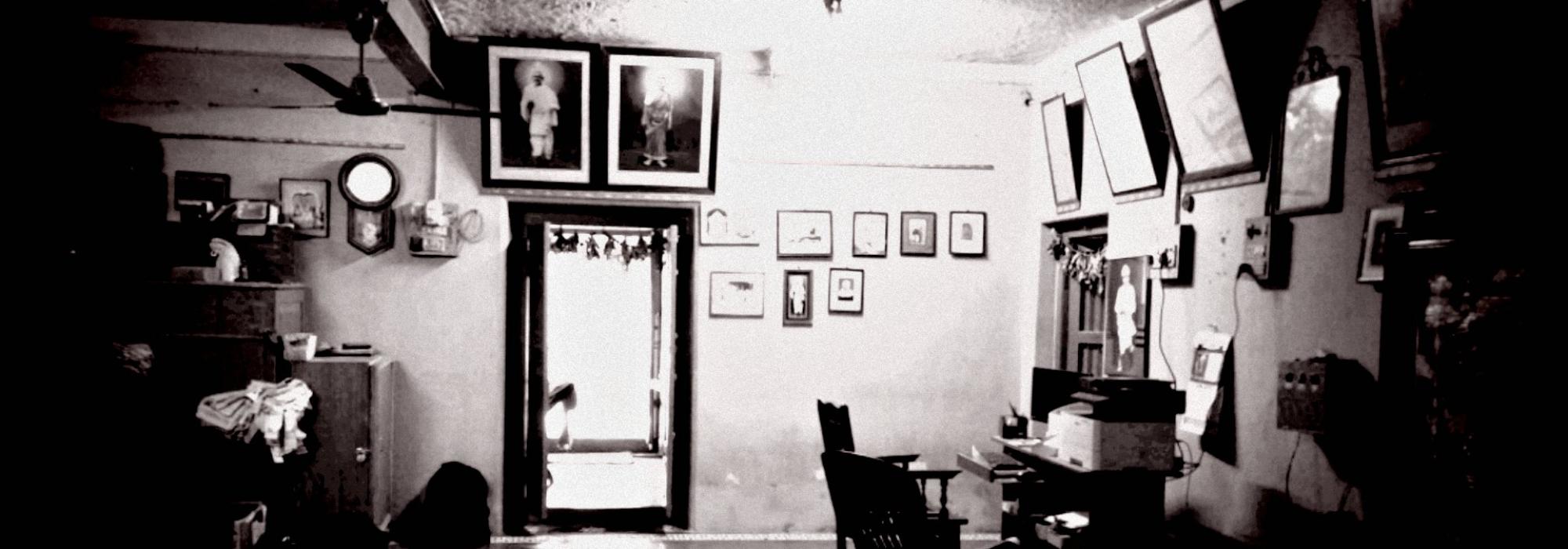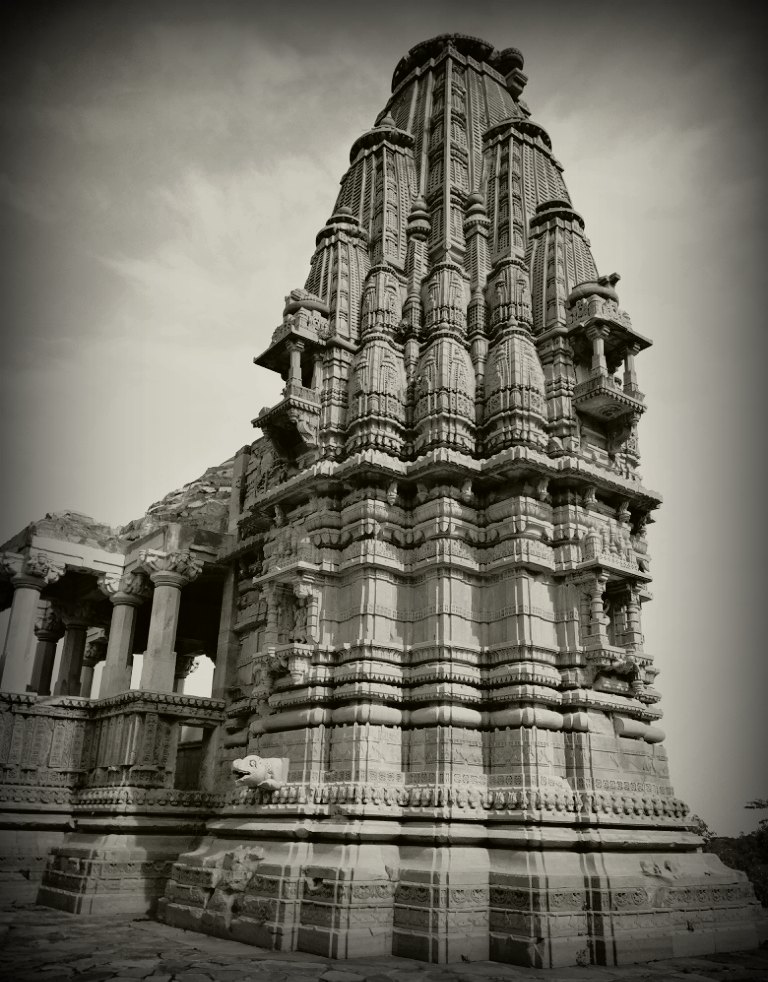About thirty-five years ago, I was getting an old house repaired. The roof in the front portion of the house had become rickety. I had assigned the entire work of pulling it out and setting it right to a contractor. Although some portions of that house weren’t in good shape, the main door was stable and looked beautiful. It had come from fifty or sixty years earlier. The contractor and I had agreed that all the work would be done without displacing the front door, letting it stay exactly as it was. But in the rush of getting the work done, there arose a reason to take out the front door and its frame. After displacing the door and the frame, he promised that he would set it exactly as it was before.
When the time came to fit the door back in its place, the workers brought the door frame, made it stand in place, and starting building walls on both sides of the frame. When the wall had attained a height of about a foot and a half, I told them that I wanted to see if the old doors fit the frame as it had before. The contractor said, “Of course they will fit, sir. Is there a doubt?” He basically wanted the work to proceed. When I disagreed and obstructed their work, the workers brought the two doors and attached them to the slots in the door frame.
When they tried to close the doors, it didn’t fit as before. I deduced that there must have been some error in fixing the door frame. The contractor said, “There’s nothing wrong with that; the doors must have some irregularity.” I couldn’t agree with him. Those doors were made from heavy, thick teak wood. It had been made ornate by skilled sculpting. It didn’t seem right to me that a door that opened and closed easily for sixty or seventy years should now be deformed.
Some harsh words were exchanged. Right at that time, a small group began forming on the street. In that group was an old man who stood smiling as he looked on. For a moment, I looked at him and then I went up to him. I asked, “Aren’t you Picchai Mudaliar?” He replied, “Yes sir, you could recognize me?” I said, “It wasn’t easy to recognize you immediately; I had to think for some time. Come, have a look at this door.” He said, “I’ve been seeing it for a while, sir” and came towards the door. He turned to the contractor and said, “If you have a piece of thread, please give it to me.” The moment he got the thread in his hand, he measured the line from the bottom corner of the left side of the threshold to the top corner of the right side. He told the contractor, “Please mark this.” When the contractor had done so, Mudaliar took the same thread to measure the distance from the bottom corner of the right side to the top corner of the left side. “Please check it now,” he told the contractor. There was a difference of about three to six inches between the two. The contractor agreed, pulled down the existing wall structure and rebuilt the wall keeping the door frame in the right place. Now, the doors sat in place perfectly.
Such was the exceptional skill of Picchai Mudaliar in his chosen profession. Even from a distance, he was capable of estimating the correct placement of the door frame. That was the subtlety and precision of his eyesight; it came from years of experience. Keeping aside one’s conscience, even if one works for a hundred years, one cannot attain such precision on immediate sight. If one wishes to become skilled in a particular task, one has to execute it with integrity.
Picchai Mudaliar would never reveal his real name. “Picchai” in Tamil means ‘alms.’ He felt that his life was given to him as alms by Lord Shiva. Thus he was ‘Shivapicchai’ Mudaliar.
He spoke little. He spoke fluently in Tamil, Kannada, and Telugu; his words were friendly and humorous.
I had heard of his story earlier and had also met him. It was twenty-five or thirty years prior to the incident with the doors. He was from Halasuru. One of my good friends was from the same place. Mudaliar was well-known to him. In those days, apparently there used to be a sadhu named Vakulabharana Paradeshi in Halasuru. He had renounced everything and was an ardent devotee of the Almighty. Both my friend and Mudaliar used to visit that sadhu often. In common parlance, ‘paradeshi’ refers to foreigner, a person from an alien land. Another meaning is: one from a higher realm, an otherworldly person. This ‘paradeshi’ from Halasuru was one who had given up worldly transactions and had taken a deep interest in higher philosophy. He would teach the philosophy of Vedanta in simple words to those who went to him. I didn’t get the opportunity to find out what the sadhu had instructed Mudaliar. Even that thought didn’t occur to me. I didn’t even think about it. Had I gotten the guts to pose that question to him, it is rather doubtful that he would have revealed that secret to me.
Picchai Mudaliar earned his living through masonry. There was no aspect of architecture or building construction that he wasn’t familiar with. From the mud roof of a poor person to a big bungalow of a wealthy man, he had the competence to build a house of any kind, which he would do with exceptional skill. Mudaliar’s attitude was that of reducing cost and increasing the convenience of the client. Stones, mud, slaked lime, gravel, bricks, wood, iron – he knew all about these materials. One could wholeheartedly trust him for completing to one’s satisfaction a range of construction-related tasks including building walls, laying tiles, constructing roofs, laying out square sections on the floor, and polishing the gravel. He would give excellent suggestions about details such as the length and breadth of a room, measurements of windows and doors, and their placements. This was the reason people always sought him. But that didn’t make him increase the cost of his labor. He would be satisfied with the wages that people typically received in that line of work.
Some of Mudaliar’s friends were in big positions in the government; some had earned a lot of money and made a name in business. But Picchai Mudaliar never tried to use them or become intimate with them. He never even spoke of them.
In Halasuru, he apparently had some ancestral property – a house and some lands. When Bangalore was hit by plague in 1899-1900, in the second round of the epidemic, Picchai Mudaliar lost his family. His two children succumbed to the disease. And within a year, his wife passed away. Mudaliar didn’t want to start a family again. For about two to three years after that, Mudaliar lived alone in his house and earned a living by his profession. All of sudden one day—nobody knows what happened—he decided to donate his house and his lands to his only sister. He kept about fifteen rupees with him and decided to tour the country. His assets consisted of the clothes he wore on his person, a blanket, one or two old dhotis, two trowels, a heavy stone, a leveler, a small Mason’s square, and a measuring stick about a foot and a half in length. Taking these with him, he boarded a train.
This was his typical method of travel: He would get off at Masala, Jolarpet after boarding from Bangalore. He would enter the city and go to a place where a house construction was in progress. There he would inquire, “Do you have a job for a laborer?” If there was work, he would work for two or three days. He would eat either at a hotel or cook by himself, save three or four rupees, tuck it into his waistband, and move on from there. When he got on the train, he would usually not determine the destination. He would discuss with his co-passengers and find out which places had the requisite facilities; then he would get off at a place that he felt he should visit. If there was a temple there, he would make a visit to see the deity. If he felt like staying back for a few days, he would do so. Else, he would proceed onward. His primary goal was to visit various pilgrimage centers and holy places. In order to support this, he worked as a daily laborer to the extent it was necessary. That was his ‘program.’ If his waistband was bereft of coins, he would get down to work. If there was no monetary pressure, then he would set out in search of temples.
In this manner, Mudaliar visited all the great pilgrimage centers of our country. He went thrice to Varanasi and Rameshwaram. He also visited Prayag, Puri, Pandharapur, Kanchipuram, Tirupati, Kalahasti, Palani, Madurai, Srirangam, Ahobilam, Bhadrachalam, Srisailam, stayed at each place for three or five days, and served the deities there. I have heard from his own mouth a concise description of his travels.
If I fail to mention the work ethic that Mudaliar adhered to, one wouldn’t get a complete picture of his personality. He was strict about the time of starting work, time of completing work, and the time of executing the work. If the town didn’t have a clock, one could fix the time by observing Picchai Mudaliar starting his work or completing his work for the day. In his entire life, nobody ever asked him, “Why are you so late?” or “Why are you leaving in such a hurry?”
Every day he would wake up at 5 am. He would recite a few Tamil stotras and prayers, cook his meal and pack it in his lunchbox before setting out. He would first visit the Someshvara temple, walk around the inner shrine in a pradakshina, bow down to the deity, and then get to work. He was a tall man, over six feet. He was lean, like a string. Thus he could walk quickly with ease.
If he held a trowel in his hand, it would move with great dexterity without slipping. He would tell the youngsters who worked with him, “See, both of us started working at the same time. Half a day’s work is finished now. How much has your wall grown, and how much has mine – see for yourself.” Mudaliar would work continuously without standing around or talking more than necessary. At noon, he would keep his trowel down, wash his hands and head out with his lunchbox.
Once I asked him, “Why do you go far away to eat your food? Why don’t you eat here? If need be, I can vacate a room for you.”
Mudaliar replied, “That’s not needed sir. I’ll go near the temple. It’s not far away. There’s water in the temple tank, large trees all around and flowering plants. In that cool shade I sit down and for a few moments I eat what Shiva has given me as alms. After sitting there peacefully for a while, I come back here.”
This was his inner world. What he wanted was peace of mind. Work, labor, food, garden – indeed, just all this was enough for that mental peace.
Just as he would arrive on time in the morning and begin working, he would put down his tools in the evening at the right time. He never gave the opportunity for anyone to pressurize him to work more. When he was following all the rules to the tee, those who employed him also had to stick by those rules. Isn’t it but natural for us to develop admiration and respect for a person who works without a tinge of dishonesty and with remarkable skill?
Once at a house that Mudaliar was constructing, there arose a situation when the door frame had to be installed. Picchai Mudaliar told the owner of the house, “Sir, if there’s anyone in your house who’s interested in performing the Threshold puja, let them do so; else, if you ask me, I could do it. Bring some turmeric and kumkuma.” The owner of the house said, “Oh why do you say so? Aren’t we brahmanas? Won’t we perform the worship?” Mudaliar bluntly said, “In these times, things have changed sir. Everyone is educated. Do they have belief in the almighty or do they not? So many women don’t even use turmeric and kumkuma anymore!” In the mean time, the girls of the house came to the door, applied turmeric and kumkuma to the threshold and the doorframe, offering flowers and sacred rice. Mudaliar stood there devotedly with folded hands and then he said, “This is good for the house.”
Picchai Mudaliar must have been about seventy years old during the incident that I mentioned at the beginning. I have not seen him since. I enquired about him at Halasuru and other places several times. I found nothing about his whereabouts. When I had asked him, “Mudaliar sir, when do I get to meet you again?” he had replied, “When the lord arranges for it. The day before yesterday, did I plan my visit here with the aim of meeting you? And did you come looking for me? The situation somehow aligned itself thus. That is the bond of ultimate debt; that is the order of the Lord.” I asked him, “Where are you traveling next from here?” He said, “To the place where the almighty takes me.”
To me, that experience was greater than whatever I had gained from reading books. I can never forget it.
This is the fourteenth chapter from D V Gundappa’s magnum-opus Jnapakachitrashaale (Volume 1) – Sahiti Sajjana Sarvajanikaru. Thanks to Sandeep Balakrishna for his incisive edits and suggestions.
















































